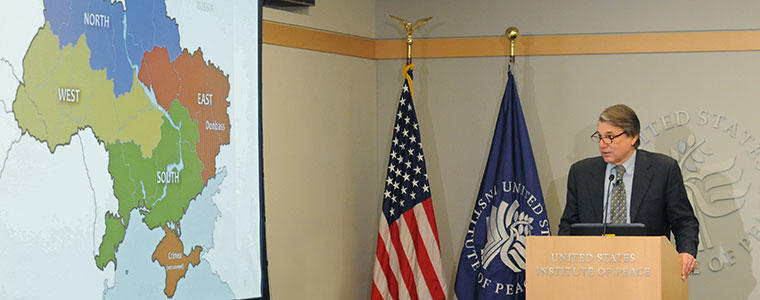Ukraine: Public Opinion Amid War
Read the Event CoverageDiscussions about how to resolve the conflict in Ukraine too often occur with limited knowledge of the views of Ukrainians, and yet they will be key to determining whether any particular resolution can last. Should the war-torn East have autonomy? Should Ukraine move toward the EU and NATO or closer to Russia? Should the U.S. provide weapons to the Kyiv government? The results of a new, comprehensive survey of Ukrainians, including those in the East, were revealed before a discussion of the findings on Monday, March 9, at the U.S. Institute of Peace.

The survey of 2,000 Ukrainians, led by political psychologist Dr. Steven Kull at the University of Maryland and administered by the Kyiv International Institute of Sociology, was conducted Feb. 13-22, beginning one day after the latest ceasefire was to take effect and spanning the fall of Dabaltseve to Russian-backed separatists. Conducted primarily through face-to-face interviews (telephone was used in some of the conflict areas), the poll also queries Ukrainians on how they think the United States, Russia, Germany, France and the EU are handling the crisis.
Kull is director of the University-affiliated Program for Public Consultation, which develops methods for enhancing the capacity of governments to consult their publics on policy decisions. He also is Senior Research Scholar at the University’s Center for International and Security Studies at Maryland (CISSM). Dr. Kull plays a central role in the BBC World Service global poll, and regularly briefs members of the U.S. Congress as well as officials of the State Department, the United Nations, and the European Commission.
Continue the conversation on Twitter with #UkrainePoll.
Speakers
Dr. Steven Kull
Director, Program for Public Consultation, and Senior Research Scholar, Center for International and Security Studies at the University of Maryland
Dr. Catherine McArdle Kelleher
College Park Professor, School of Public Policy, University of Maryland and former U.S. Secretary of Defense Representative to NATO
Amb. William B. Taylor
Acting Executive Vice President for USIP and former U.S. Ambassador to Ukraine
Christian Caryl, Moderator
Contributing Editor, Foreign Policy


